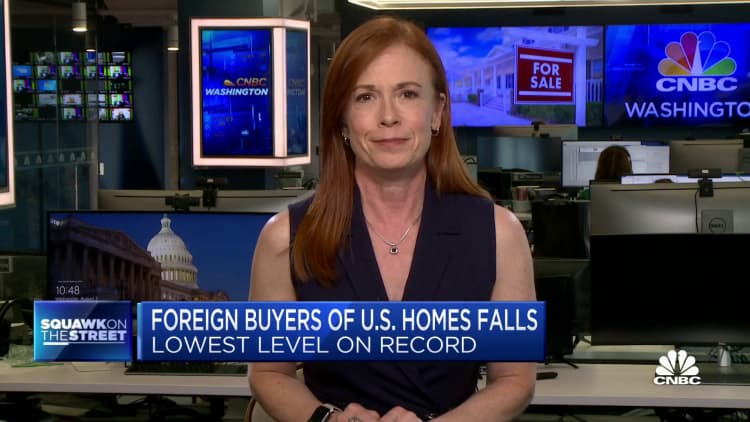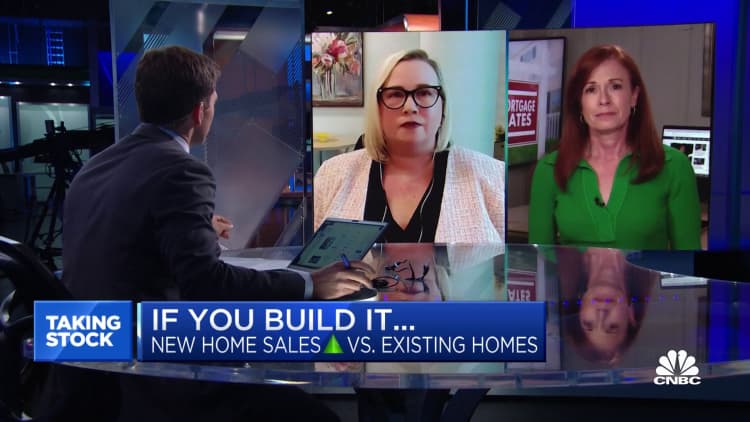Gary Burchell | Getty Images
More and more couples are becoming homeowners before they tie the knot.
According to a 2022 report from the National Association of Realtors, unmarried couples make up 18% of all first-time home buyers, up from just 4% in 1985.
The organization sent out a survey in July 2022 and received a total of 4,854 responses from home buyers who bought a main home between July 2021 and June 2022.
‘The number of unmarried couples is on the rise [as homebuyers] and now they’re at the highest point we’ve ever measured,” said Jessica Lautz, the Washington DC-based vice president of research for the National Association of Realtors.
Buying a home is a bigger commitment than renting, so while these couples would love to own a home, there are a few things they should consider before buying a home together.
Housing affordability is a real struggle
Many young, unmarried couples live together, often for financial reasons. According to a report by the Thriving Center of Psychology, about three in five unmarried couples in the US live with their partners.
It makes sense to split the cost of housing, which can be a big part of your budget.
Yet, as opposed to married homebuyers, nearly half of single homebuyers — 46% — made financial sacrifices, including finding secondary jobs, to finance their purchase, the NAR report found.
“Housing affordability is a real struggle, so as a single couple getting your finances together can make a lot of sense to move forward with that transaction,” says Lautz, who is also NAR’s deputy chief economist.
The typical single couple buying a home together for the first time is roughly 32-year-old millennials with a combined median household income of $72,500, according to Lautz. In addition, these shoppers were more likely than married couples to receive loans – 4% versus 3% – or receive money from friends and family – 12% versus 7%.
One of the reasons unmarried people decide to buy a home with their partners is the power of combining offers when it comes to financing eligibility, as real estate prices and interest rates remain high, says Melissa Cohn, regional vice president of William Raveis Mortgage. in New York City.

While you could argue that couples should just get married if they’re already investing in a home, some people may choose to keep things, such as their estates, separate.
“There are reasons why people don’t get married; it’s not automatic these days,” Cohn noted.
But unmarried couples should be careful when making a commitment of this magnitude.
There are often no legal protections they can fall back on, says Cohn. If one decides to leave, the other could be saddled with the entire mortgage and may not be able to pay it, she said.
How to secure each other’s investment
“To avoid marriage, you have to get a divorce, so there’s more staying power,” Cohn said. “If you are unmarried, you have no legal obligation to that other party.”
However, it’s counterintuitive for just about anyone to stop making mortgage payments — because it will ruin their credit, she added.
To protect their investment in the property, unmarried couples should carefully consider what the property is called. This helps to record each partner’s legal rights and property, as well as what happens to the home if one of them dies.
Talk to a lawyer about your options. These options may include designating the property as joint tenancy with survivor’s pension rights, if ownership is equal, or as joint tenancy if one partner contributes more financially.
Couples may also consider using a limited liability company or other entity, Cohn suggested. “Taking title to an entity as an LLC or a partnership allows you to better define and define who is responsible for what part,” she said.
They can also protect their share of the investments by capturing it in an ownership agreement. It determines who is responsible for the mortgage, how much each person puts into the down payment, who pays for insurance and home repairs, Cohn added.
This may be a good idea if one has a higher income than the other, she added.
Four factors unmarried homebuyers should consider
Here are four things unmarried couples should think about before buying, according to certified financial planner Cathy Curtis, founder and CEO of Curtis Financial Planning, in Oakland, Calif. property together:
1. Carefully consider draining retirement accounts for a down payment: While it’s generally not the best idea to draw from retirement funds, millennials still have years to recover, says Curtis, who also serves on the CNBC Financial Advisor Council. “The reality is, for most millennials, this is where most of the savings happen.”
Funds in a traditional IRA can be used for the first home purchase, up to the $10,000 lifetime limit. The amount will be taxed at normal rates the year it is withdrawn, but there will be no 10% penalty if it’s the first home purchase, Curtis said.
Roth IRAs are also accessible, but the rules must be closely followed, Curtis said. You can normally withdraw your contributions at any time without incurring taxes or penalties, but there are age and time requirements before withdrawn investments can count as a qualifying distribution.

Many companies allow employees to borrow from their 401(k) plans. An employee can borrow 50% of their invested balance, up to a maximum of $50,000. “If someone has $100,000 or more, they can borrow $50,000,” Curtis said. “If they only have $70,000, they can borrow up to $35,000.”
Loans must be repaid in five years or fully repaid when employment ends.
2. Check out credit reports and scores to make sure you’re getting the best possible mortgage rate: Make sure there are no inaccuracies, pay your bills carefully on time and reduce your debts as much as possible before the purchase. Keep in mind that lenders will look at both partners’ scores if both are on the mortgage application.
3. Keep credit activity low: Avoid making large purchases with credit cards and opening or closing new lines of credit as they can affect your credit score.
4. Save money in a high interest savings account: Instead of keeping your down payment savings in the stock market, consider using a high-yield savings account. “The market could fall the moment the money is needed,” Curtis added. “Fortunately, the rates are very good at the moment.”
